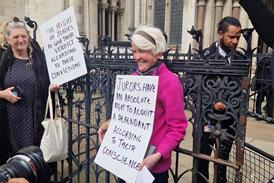The Junior Lawyers Division says it has lost confidence in the Solicitors Regulation Authority to fairly prosecute young solicitors whose judgement is clouded by pressures of work.
Charlotte Parkinson, chair of the JLD, wrote last week to SRA chief executive Paul Philip calling for an immediate review in its approach to handling junior lawyers who report mental health issues or a toxic working environment.
Her criticism follows the high-profile prosecution of recently-qualified Claire Matthews, who lied to cover her mistake of leaving sensitive documents on a train. Matthews was struck off by the Solicitors Disciplinary Tribunal but has given notice she will appeal, supported by lawyers working pro bono.
Parkinson said the JLD was ‘remarkably concerned’ that the SRA had continued its prosecution given what Matthews had reported about her mental health at the time of the misconduct. If her condition was brought up only during the hearing, Parkinson said, the SRA should have adjourned the hearing immediately to consider the risk.
‘Given the circumstances of Ms Matthews’ case, we do not believe that the SRA’s decision to prosecute was reasonable,’ added Parkinson.
The Matthews case had echoes of previous cases involving Emily Scott and Sovani James where young lawyers were banned despite reporting toxic work environments and working under extreme pressure.
Parkinson said: ‘Regrettably, taken in the round, the Sovani James, Emily Scott and Claire Louise Matthews prosecutions have shaken our faith in the SRA’s judgement to the point where we do not have confidence in its approach to regulatory matters.’
The JLD is calling for the SRA to examine its own approach and regain the trust of solicitors, particularly addressing the issue of junior lawyers being unwilling to report a toxic culture in their firm for fear of being prosecuted themselves.
Parkinson added that the SRA’s recent approach runs the risk of mistakes being concealed for fear of disproportionate sanctions – in turn increasing the risk that mistakes are not rectified and defeating the purpose of regulation.
The JLD has also written separately to the SDT to outline concerns about the sanction imposed against Matthews, in particular questioning an apparent disparity between the penalties applied to barristers and solicitors.


















![David Lester (senior partner at Blythe Liggins), Darryl Barnes, Jagdeep Sandher (head of dispute resolution at Blythe Liggins)[4]](https://d1d8vslyhr7rdg.cloudfront.net/Pictures/274x183/4/2/8/116428_davidlesterseniorpartneratblytheligginsdarrylbarnesjagdeepsandherheadofdisputeresolutionatblytheliggins4_981603_crop.jpg)








24 Readers' comments